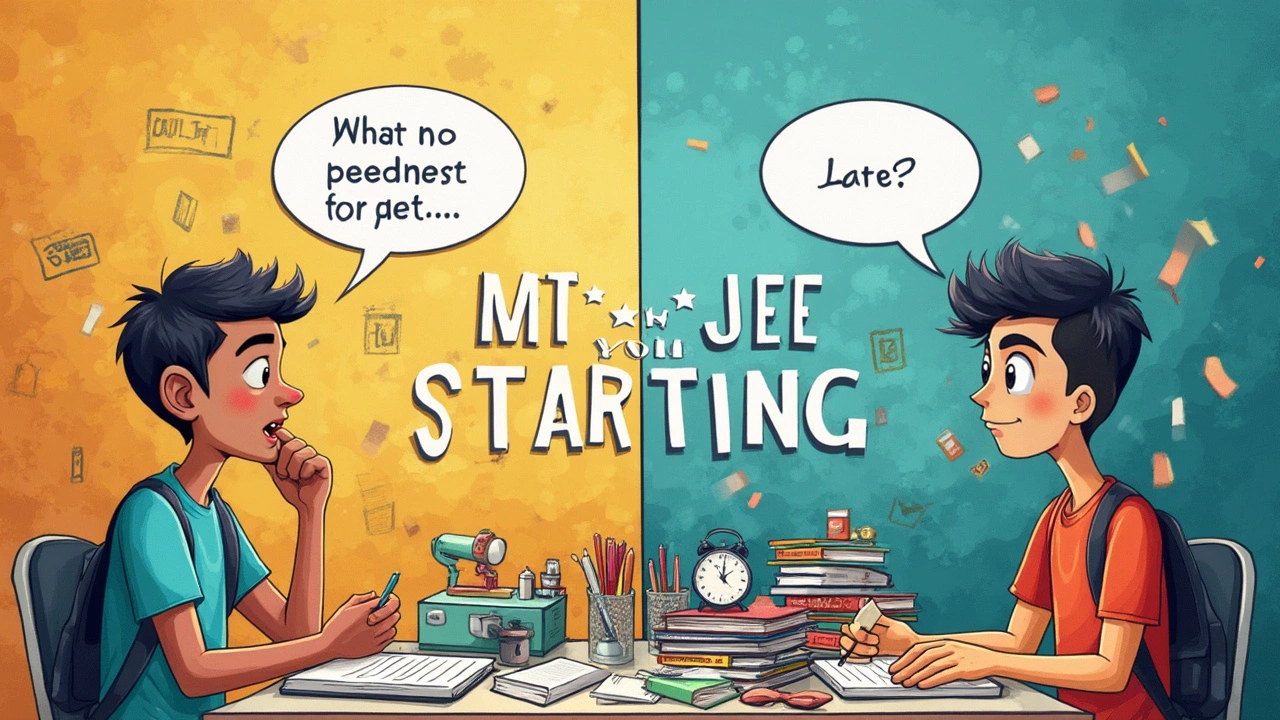Panic usually kicks in when someone drops the word “IIT” at a family dinner. It feels like if you're not solving calculus by Class 7, you’re already behind. But here’s the truth: most JEE toppers start their serious prep in either Class 9 or 11. Picking the right class to kick things off isn’t just about what’s “early”—it’s about what’s smart for your brain and stress levels.
So, which class actually works best? If you dig into interviews from actual IITians, you’ll spot a pattern. Few start full-blown JEE coaching before Class 8, and those who begin very late often chase their tails. Starting too early risks burning out, while joining the race late means you’ll be hustling to cover two years of advanced topics in just one. There’s a sweet spot, and the best prep starts when your basics are strong enough to not crumble under JEE-level questions.
Want to know how to spot that sweet spot for yourself? Stick around, because we’ll get into real stories, debunk some myths, and map out an actual plan instead of tossing vague advice your way.
- Why Timing Matters for IIT JEE
- Typical Starting Points: Real Stories
- Advantages of Starting in Class 8, 9, or 10
- Pitfalls of Starting Too Early or Too Late
- Smart Preparation Roadmap
Why Timing Matters for IIT JEE
Getting the timing right is probably the most underrated part of IIT JEE preparation. Loads of students think starting earlier guarantees a spot in the ranks, but that’s only half the story. What actually makes or breaks preparation is whether you start when your mind’s mature enough to handle the JEE’s level of questions, and when you’ve got a strong hold on your basic math and science concepts.
JEE tests aren’t just difficult because of the syllabus. It’s all about the depth of questions and the speed at which you need to solve them. If you start too early (like, in Middle School) without the grounding in algebra or physical chemistry, you’ll likely end up memorizing stuff you don’t really get. On the flip side, if you only tune in at the last minute, you’re setting yourself up for mad pressure and, for most folks, a low score.
Here’s the thing: the key years when students are cognitively and emotionally ready usually align with either the end of Class 9 or the beginning of Class 11. Most coaching centers in India—especially the big names in Kota—structure their batches to start right after Class 10 board exams. That’s not random; data says more than 65% of JEE Advanced rankers enter some form of coaching post-Class 10.
If you’re still in doubt, check out this breakdown from a couple of years back:
| Starting Class | Rankers (%) |
|---|---|
| Before Class 9 | 7% |
| Class 9-10 | 28% |
| Class 11 | 64% |
| After Class 11 | 1% |
You can see most toppers don’t rush in too soon. They start after their basics are solid but before it’s panic time. That way, they can focus on understanding, not just covering the syllabus. It also gives them enough time to do multiple rounds of mock exams and actually fix what goes wrong.
Bottom line: timing your start means you’re not just grinding for hours. You’re being smart about when your brain is ready to absorb and apply all the intense stuff the exam throws at you.
Typical Starting Points: Real Stories
If you ask around in any IIT hostel, you’ll get a mix of answers about when people truly started their IIT JEE preparation. Most admit to getting serious in either Class 9 or 11—not as kids clutching physics guides in Class 7. Some even say they only switched gears after their tenth board exams.
Here’s the thing: a lot of coaching institutes recommend starting in Class 8 or 9, especially for foundation courses. These aren’t the full JEE mill yet, but you’re building stamina and getting comfortable with tougher school math and science. Once you’re into Class 11, that’s when classic JEE prep—mock tests, years of past papers, those crushing weekly schedules—really kick in.
Check out this sample timeline, based on conversations with a few recent IITians:
- Ayush (IIT Bombay, Computer Science): Began foundation classes in Class 9, say his basics stayed strong. Full JEE syllabus started right after Class 10 boards.
- Meera (IIT Delhi, Chemical Engineering): Didn’t take any coaching before Class 11, but did well in science olympiads. Says independent learning helped her cope with JEE’s pace.
- Suresh (Rank in 600s, 2023): Started JEE prep seriously in Class 10, admits rushing through some basics but “caught up” by revisiting fundamentals in the first few months of Class 11.
If you want numbers, surveys from popular platforms like Resonance or Allen routinely show that about 35% of JEE Main toppers began focused prep in Class 10, with about 50% diving in after their Class 10 exams. Only around 10% started in Class 8 or earlier.
Why do so many people wait? It’s not laziness. Balancing competitive prep and schoolwork is already tough; starting too young means you risk forgetting what you studied by the time you actually sit for JEE. Foundation courses are great for laying the groundwork, but for most, the real JEE journey begins when school basics are rock solid and there’s an actual plan in place—usually Class 9 or definitely Class 11.

Advantages of Starting in Class 8, 9, or 10
If you’re thinking about ramping up your IIT JEE preparation, classes 8 to 10 hit that sweet spot for a few solid reasons. It’s not just about clocking in more study hours; it’s about building the kind of foundation that can actually handle tough concepts later on. At this stage, you’re still getting comfy with algebra, trigonometry, basic physics, and chemistry—the same stuff that JEE drills you on, but dialed up a notch.
Here’s what starting early (but not too early) really gets you:
- Better Concept Clarity: When you dive into core topics before the mad rush of class 11, you get more time to ask “why?” instead of just memorizing answers. That means tougher questions become easier later on.
- Less Stress in Classes 11 and 12: Most toppers say classes 11 and 12 are rough—busy schedules, crazy homework, and the pressure to score high in school boards and IIT JEE. If you’ve nailed the basics before this, you’re not constantly playing catch-up.
- Flexibility in Planning: You can experiment with different study methods, coaching centers, or online courses and see what fits you. No coach will kick you out for starting in class 9!
- Stronger Problem-Solving Skills: Early starters usually perform better on logic-based and application-heavy questions, since they’ve practiced connecting the dots for years instead of months.
- Confidence and Consistency: Confidence grows when you realize you can solve tougher problems without panic. And the slow, steady approach avoids that last-minute cramming panic that burns out even the best students.
And just to clear things up, here’s how some students who started at different classes fared, based on a poll from a popular coaching platform:
| Starting Class | Percent Qualifying JEE Main (2024 data) |
|---|---|
| Class 8 | 77% |
| Class 9 | 74% |
| Class 10 | 68% |
| Class 11 | 59% |
Jumping in around class 8, 9, or 10 isn’t about piling on stress—it’s the opposite. You break it down into smaller, more manageable chunks, and actually have time for friends, games, and, if you’re like me, Saturday night pizza with Leah. The trick is to build that base early, so you’re ready to go full throttle when it really counts.
Pitfalls of Starting Too Early or Too Late
Everyone hears stories of kids who start mugging up chemistry formulas in Class 6, but few talk about what actually happens if you begin your IIT JEE preparation way too soon or leave it off until the last lap. Here’s what you really need to know.
Starting super early, like before Class 8, leads to major burnout for most students. You’ll see kids mastering trigonometry by 12, but by the time the real grind starts in Class 11 and 12, their motivation is often shot. I chatted with my cousin who finished NCERT Class 12 maths in Class 8—by the time he actually sat for JEE, his interest had hit rock bottom. And he's not alone. A 2023 survey by Resonance (a top coaching institute) showed that students who started before Class 8 were 42% more likely to drop out of coaching programs by Class 11 due to exhaustion or boredom.
"Pushing a child too early into advanced topics can create unnecessary pressure and end up harming their long-term performance and mental health." – Dr. Rajeev Singh, Educational Psychologist
Now, what about starting too late? Jumping onto the JEE train in Class 12? Well, you’re in for a rough ride. The syllabus is huge and the concepts run deep. Trying to finish all of it in one year means most students end up only skimming instead of really learning. The end result? Gaps in understanding that show up big time on the exam day. Not a surprise that about 70% of those who clear JEE Advanced started targeted prep by Class 10 or 11, according to FIITJEE results data published in 2024.
Here’s a breakdown of what usually trips up students when they start at each extreme:
- Too Early: Loss of interest, mental fatigue, missing out on regular school and childhood activities
- Too Late: Rushed concept learning, lack of practice, constant stress trying to play catch-up
The sweet spot is finding that period when you’re mentally ready for tougher concepts, but also fresh and motivated enough to stick with it for the long haul. If a student feels pressured or burned out before they hit the main JEE syllabus (which starts seriously in Class 11), it’s a red flag. If they start so late they’re skipping fundamentals, it’s another one.

Smart Preparation Roadmap
If you want to crack the IIT JEE preparation game, strategy matters as much as hard work. The best students don’t just study more—they study smarter. Here’s what a winning plan actually looks like.
First up: Know your basics. If you're in Class 9 or 10, nail down NCERT textbooks. These are your bread and butter. It’s shocking how many toppers say NCERT helped them more than fancy coaching materials, especially for chemistry basics. No matter what, don’t skip these.
- Class 9–10: Spend time mastering all science and math concepts in your school books. Make short notes of formulas, definitions, and tricks. Start solving Olympiad or NTSE level questions if you want a challenge, but don’t stress about JEE-level stuff just yet.
- Class 11: This is the jump. The real action starts here. Join a decent JEE coaching if you can, but it’s not life or death (YouTube channels work if you’re disciplined). Stay synced with the coaching or school schedule—don’t get ahead or fall behind. Daily practice and weekly revision should become a habit.
- Class 12: Now, it’s about consistency and speed. Give mock tests under timed conditions like it’s the real exam. Analyze mistakes in every test. Focus more on areas where you lose marks. Don’t try to do new books last minute—stick to what you know and build confidence.
Here’s how a year might break down if you start in Class 11:
| Month | Main Focus |
|---|---|
| April–June | Build concepts in Physics, Math, Chemistry (basics first) |
| July–September | Start mixed chapter practice; weekly revision |
| October–December | Begin coaching tests and Olympiad questions |
| January–March | Review weak topics; take your first full JEE pattern mocks |
And remember—don't ignore sleep, food, and actual breaks. I’ve seen friends burn out by pushing 8-10 hour days non-stop. Most toppers stay in the 5-6 hour range, but they’re focused during that time—phones in another room, no Instagram, and real breaks outside, not glued to a chair.
Big tip: Don’t just collect books and material from every topper in your colony. Pick one source per subject and build your strategy around it. Too many resources just confuse and stress you out. Trust your process.
Your roadmap doesn’t have to look like anyone else’s, but it does need these checkpoints: Basics solid in Class 9-10, concepts built strong in Class 11, exam practice and revision in Class 12. Keep it simple, stay consistent, and you’ll be better off than most who get lost in the hype.
